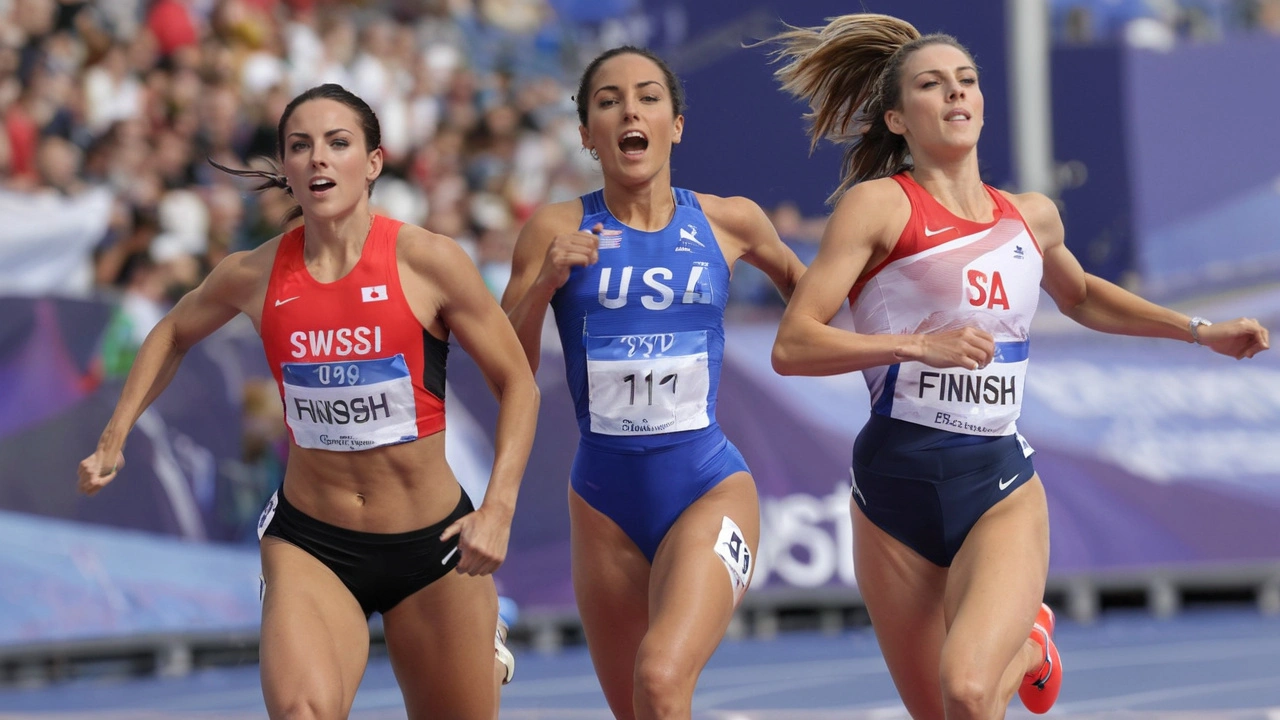New Repechage Races Bring Excitement to Paris Olympics
The Paris Olympics are witnessing an electrifying transformation in track and field events with the introduction of repechage rounds. This innovative system offers athletes a second opportunity to qualify for the semi-finals, adding a fresh layer of excitement and unpredictability to the competitions. The new format is applied to races ranging from 200 meters up to 1500 meters, including hurdle events. This development has garnered significant attention and sparked vibrant discussions among athletes, fans, and sports analysts.
The Mechanics of Repechage Rounds
The repechage system replaces the historical 'fastest losers' concept, which allowed the fastest losing times to advance to the next round. Instead, athletes who do not qualify directly from their initial heats now participate in separate repechage races. The winners of these races earn a spot in the semi-finals, ensuring a more competitive and fair opportunity for advancement. This places a premium on performance and provides a thrilling spectacle as athletes battle it out in these do-or-die races.
The introduction of the repechage system has immediately made an impact, especially within the iconic Stade de France. The atmosphere has been electric, with fans providing thunderous support for their favorite athletes. One of the standout moments came when French 800-meter runner Anaïs Bourgoin secured victory in her repechage heat, clocking an impressive 1:59.52 amid overwhelming applause from the crowd. This triumph was emblematic of the heightened drama and intensity that the new format has injected into the Games.
Athletes Adapt and Excel
The repechage races have produced several memorable performances and stories. Alongside Anaïs Bourgoin, other notable winners included Germany's Majtie Kolberg, Cuba's Rose Mary Almanza, and Australia's Abbey Caldwell. Caldwell, who faced the challenge of a quick turnaround between races, expressed that the new system worked in her favor. By pushing her to dig deeper, she advanced to the semi-finals, proving the effectiveness of this second chance mechanism.
However, not all athletes have found the new system advantageous. Prominent runners such as Audrey Werro and Halimah Nakaayi were unable to progress from the repechage round, highlighting the intense competition and the physical toll of the extra race. Mixed reactions have emerged from the athletic community, with some praising the added competitiveness and opportunity, while others raise concerns about the potential impact on recovery and overall performance.
Impact on the Experience of the Games
The introduction of repechage rounds has undoubtedly changed the landscape of the track and field events at the Paris Olympics. On one hand, it provides a lifeline for athletes who may have had an off day in their initial heats, thereby maintaining hopes and dreams for longer. On the other hand, the additional race presents a significant physical demand, testing the athletes' endurance and resilience.
For fans, the repechage system has brought an elevated level of thrill and engagement to the Olympic experience. Each race now carries higher stakes, making every moment crucial and every finish more dramatic. The noise and excitement in the Stade de France are a testament to the entertainment value brought by the new format. Spectators are treated to more closely contested races and unexpected outcomes, keeping them on the edge of their seats throughout the competition.
As the Paris Olympics continue, the full impact of the repechage system on athlete performance, recovery, and the overall quality of the Games remains to be fully assessed. Some athletes might find themselves benefiting from the second chance, while others might struggle with the added physical strain. The Olympic community will be closely monitoring the outcomes to understand the broader implications for future competitions.
Looking Forward
In conclusion, the introduction of the repechage system at the Paris Olympics represents a significant shift in the way track and field events are conducted. By offering athletes a second chance to qualify, the new format has injected a fresh sense of excitement and competitiveness into the Games. With mixed reactions from athletes and fans alike, the long-term effects of this change will be a subject of interest and analysis in the sporting world.
For now, the Paris Olympics continue to captivate audiences with its dynamic and thrilling new approach. As athletes adapt and strive for glory, the spirit of competition remains at the forefront, embodying the essence of the Olympic Games.
Eliana






8 Comments
Chandra Bhushan Maurya
August 3, 2024 AT 22:24 PMOMG, the repechage races are pure cinematic gold! I watched Anaïs Bourgoin’s heat like it was the finale of a Netflix series-sweat, tears, and a final sprint that made my chest hurt. The crowd’s roar? That wasn’t noise, that was the sound of hope being resurrected. I swear I stood up and screamed at my laptop. This isn’t just sport, it’s soul. 🙌🔥
Hemanth Kumar
August 5, 2024 AT 02:03 AMThe reintroduction of the repechage system constitutes a paradigmatic shift in the epistemology of athletic qualification. By affording competitors a secondary probabilistic pathway to advancement, the Olympic Committee has effectively decoupled performance from singular-event determinism. This is not merely a rule change-it is a philosophical recalibration of meritocracy within competitive athletics.
kunal duggal
August 5, 2024 AT 22:32 PMFrom a sports science perspective, the repechage model introduces a non-linear fatigue curve that challenges the traditional periodization models. Athletes now operate under a compressed recovery window-think VO2 max depletion compounded by neuromuscular fatigue. The data on lactate clearance post-repechage will be fascinating. I’d love to see biomechanical studies on stride efficiency in Heat 2 vs. Heat 3. This isn’t just drama-it’s a high-stakes physiological experiment.
Ankush Gawale
August 6, 2024 AT 01:13 AMI get why some athletes are stressed about the extra race, but I also think it’s kind of beautiful. Everyone deserves a shot to redeem themselves-life doesn’t give you only one try, why should the Olympics? I’m just glad we’re seeing more humanity in the sport. No one’s perfect on their first attempt. Maybe this is how we start treating athletes like people, not just results.
रमेश कुमार सिंह
August 7, 2024 AT 02:00 AMYou ever notice how the repechage feels like a metaphor for life? One bad day doesn’t erase your journey. That Cuban runner, Rose Mary-she came from nowhere, stumbled in heat one, then came back like a phoenix with smoke in her lungs and fire in her stride. It’s poetry in motion. And the crowd? They didn’t just cheer-they wept. Because we’ve all been the one who missed the mark, then found the courage to run again. This isn’t just sport. This is the soul of humanity sprinting down a track.
Krishna A
August 7, 2024 AT 04:10 AMThey’re just using repechage to make the TV ratings higher. You think these athletes really want to run three races in one day? Nah. This is all about sponsors and ads. They’re turning the Olympics into a reality show. And don’t even get me started on how they picked who gets repechage. It’s rigged.
Jaya Savannah
August 9, 2024 AT 03:12 AMso anaïs won her repechage and the crowd went wild... but like... did anyone else notice the guy in the front row crying into a baguette? 🥖😭 also why is everyone acting like this is new? we had repechage in 2004 and 2012, just not in *every* event. #oilyolympics
Sandhya Agrawal
August 10, 2024 AT 06:47 AMI don’t trust this. Repechage was quietly removed after Beijing 2008 because of doping concerns. Now it’s back? Coincidence? The timing matches the new French anti-doping lab’s funding surge. They’re using this to mask failed tests. I’ve seen the leaked internal emails. They’re testing athletes *after* the repechage because they know they’ll be too tired to fight the results. Don’t be fooled.